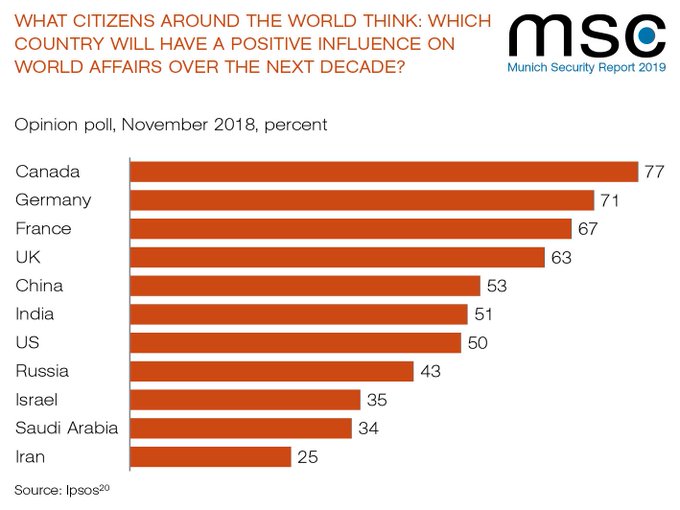To be clear, as I have argued and as much IR scholarship argues, bullying produces backlashes, that it is counterproductive, but countries have a choice about whether and how to be part of that backlash.
The key is this: there is no one obvious way to do this. While the whole "never appease aggressors" thing was a lesson learned after World War II, it was overlearned. Sometimes, giving an aggressive country something of what it wants actually does address the grievance and prevents the escalation of conflict. Sometimes, however, it encourages the aggressor to do more. The challenge for Canada, for Germany, for Japan and others is that there are multiple bullies out there now, and they have varying appetites: Trump, China, Russia, and the Saudis. Yes, there may be others, but these are the most visible and most relevant at this moment (call me when we really care what Bolansaro's Brazil does on the world stage).
The revision of NAFTA occurred through a drawn out process where Trudeau and Canada tried to pander to Trump and pay his family (via helping Ivanka recover her brand). For a while, it seemed to work, but then Trump started getting far more aggressive, including imposing tariffs on steel and aluminum and threatening the Canadian auto industry. Trudeau mostly held his ground--NAFTA 1.01 or USMCA or whatever you want to call the new deal did not give the US much but gives Trump the chance to declare victory. Yet Trudeau was willing to sign it while steel and aluminum tariffs remained in place. Is that appeasement or confrontation? Probably a bit of both, but I think Trump reacted so strongly in tweets and statements because he thought he could roll over Canada and Trudeau, and he found out that he could not. The question now is, if the deal gets ratified, will Trump come back for more? Will Trump ever drop the tariffs? So far, Trudeau's mixture of pandering, accepting reality (NAFTA 1.01), and pushing back on Trump's more outlandish statements seems to be the least bad way to respond.
China? Oh my. China has pushed back very aggressively after Canada responded to a US request to extradite a key Huawei official, taking hostages. Whatever one makes of the McCallum statement and then firing, it looks like Canada is not going to hand over this woman to the Chinese. Which means any progress on a trade deal or anything else is mostly dead. Canada didn't ask for this, but is now stuck.
Saudi Arabia? Ah, this is one Canada has chosen and keeps on choosing. Perhaps Canadian officials didn't think that a tweet would lead to such a backlash, but it has. And what does Canada do? It welcomes a Saudi teen who desperately wants asylum. It does not stop selling armored vehicles because, well, the previous government signed an onerous contract and there are jobs at stake in Ontario. But, in pretty much every other public way, Canada is responding to Saudi bullying by standing firm. Again, aside from arms sales, this is not that hard to do since Canada does not really depend on the Saudis, and the Saudi sanctions have pretty much wiped out any incentive to play nicely with the Saudis. The Saudis are making themselves very unpopular, so this policy does not have the steep costs that conflict with China has or antagonizing Trump.
Opposing the bullies, who are near or under water, is good for Canada's reputation apparently. It is probably not bad for domestic politics, as it will be hard for the Conservatives or NDP to argue that the Liberals should have been more willing to appease Trump, given the outcome thus far and reality that Trump is not easy to manage or that the Liberals should have ignored its legal obligations re extradition. Indeed, now the Liberals have an excuse for what was a botched effort to engage China. And maybe, just maybe, this might lead to improving relations with India despite the messy trip there.
A Canadian-German alliance against bullies and, ironically, against appeasement may not be a bad way to help buttress the international order. Kristof overstates the Canadian role, but this is a role that serves Canada's interests and is not bad for domestic consumption.

No comments:
Post a Comment